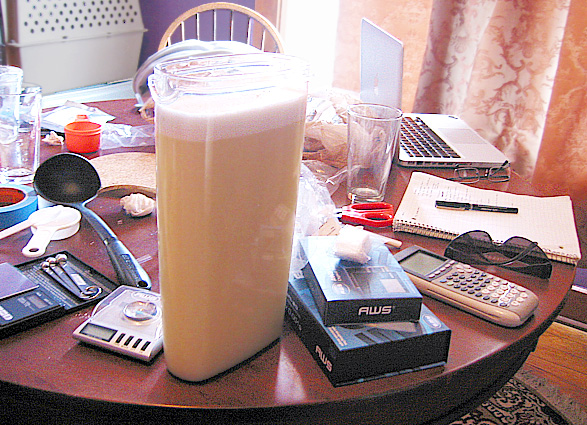If you could get all of your vital nutrients and calories by drinking a single liquid concoction, would you do it? A new drink called Soylent purports to help you do just that. Sold as a mixture of powdered ingredients and oil (you just mix it with water), Soylent contains thirty five nutrients, vitamins, and minerals, and provides sufficient calories to be an all-in-one meal. Is this the food of the future?
Happily, Soylent is definitely not people! Source: Soylent Green
As discussed here and here, it’s challenging to know what constitutes a healthy diet. Supposing you have a good understanding of nutrition, it’s difficult to spend time and energy to prepare and eat good food. How often do you eat enough fruits and vegetables? Do you take unhealthy shortcuts (like eating food out) when you are busy? In these situations, it’d be convenient to have an easy, cheap alternative.
Does Soylent fit this bill? I was unable to find any published research on the product (it only recently became available), although other liquid diet alternatives are out there, albeit for medical uses. The convenience is undeniable; saving the time spent on shopping, food prep, and planning meals could be a big boon for us busy Americans.

However, it’s not the most visually appealing dinner I’ve seen. Source: Wikimedia commons
While Soylent has an FDA-approved nutrition label that verifies its contents, some nutritionists are concerned about people using it to meet their nutrition needs because of the unknowns benefits of whole foods. For instance, how do different nutrients in fruits and vegetables (like some phytochemicals or terpenes) affect health? Does consuming individual nutrients as a powder rather than in whole foods affect how they are absorbed or interact with our bodies? At this point, we don’t fully understand exactly why these compounds are helpful (phytochemicals may have anti-cancer properties), nor do we know how our body interacts with our food in general. By ignoring these (and other) unknowns, we may be missing out on important nutritional benefits.
Soylent doesn’t purport to have any special health benefits (anti-cancer, etc…), although it theoretically contains the nutrients that we currently understand to be necessary for human functioning. The creator of Soylent and others have lived on it for varying amounts of time (some over a year) with no negative health problems. Soylent is recently available; the creators ran a successful Kickstarter campaign to fund their idea and has started shipping out Soylent to the public.
So what’s next? The cat is out of the bag; we can’t wait for further testing before people go on the Soylent diet. Thus, I think we should science the crap out of it. If people are willing to drink Soylent as their main form of sustenance, we should ask them to participate in cohort studies or randomized control trials. This would provide us with strong data to test the effects of a Soylent diet compared to non-Soylent diets.

Source: thinkgeek
I’m never going to give up whole foods (I can’t even claim to want to become a vegetarian), but I see how Soylent could have many uses. It could be a good alternative for a quick meal, especially compared to fast food or the processed junk that passes for food these days. While it isn’t that cheap yet (currently 5$ per day per person), it could be used in emergency situations or to supply people in need through programs like WIC. But do we want to trade the rich food tradition of humanity for a nutrient slurry? I sure don’t.
References
Surh, Young-Joon. “Cancer chemoprevention with dietary phytochemicals.” Nature Reviews Cancer 3.10 (2003): 768-780. link
Russell, Wendy, and Garry Duthie. “Plant secondary metabolites and gut health: the case for phenolic acids.” Proceedings of the Nutrition Society 70.03 (2011): 389-396. DOI
